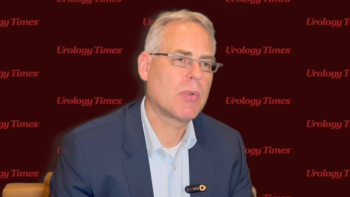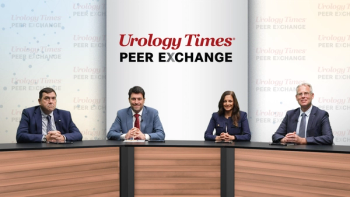
EV+P demonstrated superior efficacy to chemotherapy across all specified subgroups assessed.

EV+P demonstrated superior efficacy to chemotherapy across all specified subgroups assessed.

Panelists discuss the characteristics of an ideal multidisciplinary team for managing BCG-naive, high-risk non–muscle-invasive bladder cancer (NMIBC), emphasizing the need for oncologists and urologists to collaboratively prepare for successful patient outcomes across different markets, while also identifying necessary educational resources and highlighting adverse events that require attention in preparation for product launches.

Panelists discuss existing and upcoming data in non–muscle-invasive (NMIBC) bladder cancer treatment, including insights from the BladderGATE trial on frontline use of PD-1 inhibitors combined with BCG and the enfortamab vedotin plus pembrolizumab combination while also addressing the significance of clinical complete response as an end point and the potential role of circulating tumor DNA in future evaluations.

Panelists discuss how the differences in routes of administration, durations of therapy, and control arms among PD1/PD-L1 inhibitors in trials may impact patient care, resource utilization, and treatment adherence, highlighting key insights from recent Uro Oncology presentations.

Panelists discuss the specific PD-1/PD-L1 inhibitors currently being investigated in phase 3 trials for BCG-naive patients with non–muscle-invasive bladder cancer (NMIBC), including CREST, POTOMAC, KEYNOTE, and ALBAN, detailing how routes of administration and durations of therapy vary among these agents and emphasizing the significance of differences in control arms within the trials.

Panelists discuss how various factors, such as route of administration, duration of therapy, safety, efficacy, and cost, could influence the selection of different PD-1/PD-L1 agents once they receive approval, highlighting the importance of these considerations in optimizing patient care.

Panelists discuss how urologists and oncologists must collaborate to improve outcomes for high-risk non–muscle-invasive bladder cancer (NMIBC) patients receiving combination therapy with PD-1/PD-L1 inhibitors and BCG, emphasizing the need for clear communication and coordinated care strategies.

Panelists discuss how combining BCG with PD-1/PD-L1 inhibitors may enhance antitumor activity compared with using each agent alone, emphasizing the rationale for this combination therapy and its potential to evolve treatment strategies for non–muscle-invasive bladder cancer (NMIBC) while also considering the implications for patient flow in urology practice and the necessity of a multidisciplinary approach.

Panelists discuss how the PD-1/PD-L1 pathway plays a crucial role in cancer immunotherapy, outlining its mechanisms of action and highlighting the agents currently being investigated for patients who are BCG-naive or unresponsive, including gene therapy and intravesical options.

Panelists discuss how standard treatment options for non–muscle-invasive bladder cancer (NMIBC) include BCG therapy, exploring its mechanism of action in enhancing the immune response while also examining management strategies for intermediate and high-risk patients, optimal outcomes with single-agent BCG, and the discrepancies between observed rates of recurrence and progression in clinical practice and reported data.

Panelists discuss how non–muscle-invasive bladder cancer (NMIBC) presents with specific symptoms and diagnostic procedures, emphasize the significant economic burden on health care systems, and highlight key risk factors like smoking and occupational exposure while also addressing the critical importance of accurate staging for guiding treatment decisions and the potential consequences of incorrect staging on patient outcomes.

Published: September 30th 2024 | Updated:

Published: October 7th 2024 | Updated:

Published: October 7th 2024 | Updated:

Published: September 30th 2024 | Updated: